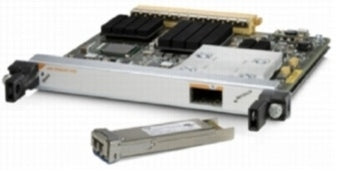You have no items in your shopping cart.
0item(s)
You have no items in your shopping cart.
0 in stock
The Cisco Interface Flexibility (I-Flex) design combines shared port adapters (SPAs) and SPA interface processors (SIPs), taking advantage of an extensible design that facilitates service prioritization for voice, video, and data services. Enterprise and service provider customers can take advantage of improved slot economics resulting from modular port adapters that are interchangeable across Cisco Systems routing platforms. The Cisco I-Flex design maximizes connectivity options and offers superior service intelligence through programmable interface processors that deliver line-rate performance. Cisco I-Flex enhances speed-to-service revenue and provides a rich set of quality-of-service (QoS) features for premium service delivery while effectively reducing the overall cost of ownership. This data sheet contains the specifications for the Cisco 1-Port 10 Gigabit Ethernet Shared Port Adapter, Version 2 (Cisco 1-Port 10-GE SPA; shows a SIP with 10 Gigabit Small Form-Factor Pluggable [XFP] optics).
Product Overview
Applications
• Residential Triple Play
• Metro Ethernet Services
• Converged Residential and Business Services
• Internet Peering
• Inter- and intra-point of presence (POP) Aggregation
Key Features and Benefits
• Modular, flexible, intelligent interface processors
– Flexible design allows mixing and matching of interface types on the same interface processor for consistent services, independent of access technology.
– Programmable interface processors provide flexibility for the service diversity required in next-generation networks.
– Innovative design provides intelligent delivery of services without compromising performance.
• Increased speed-to-service revenue
– The programmable Cisco architecture extended to 10 Gigabits per second dramatically improves customer density, increasing potential revenue per platform and facilitating compatibility with future versions.
– Interface breadth (copper, channelized, POS, ATM, and Ethernet) on a modular interface processor allows service providers to quickly roll out new services, facilitating consistent, secure services for all customers, large and small.
– XFP interfaces are featured for high-port-count applications with reach flexibility. Future optical technology improvements can be adopted using existing SPAs.
• Dramatically improved financials for your routing purchase
– Improved slot economics and increased density reduce capital expenditures (CapEx).
– The ability to easily add new interfaces as they are needed facilitates a "pay-as-you-grow" business model while still offering a high-density solution.
– SPAs are shared across multiple platforms and can be easily moved from one to another, providing consistent feature support, accelerated product delivery, and a significant reduction in operating expenses (OpEx) through common sparing as service needs change.
